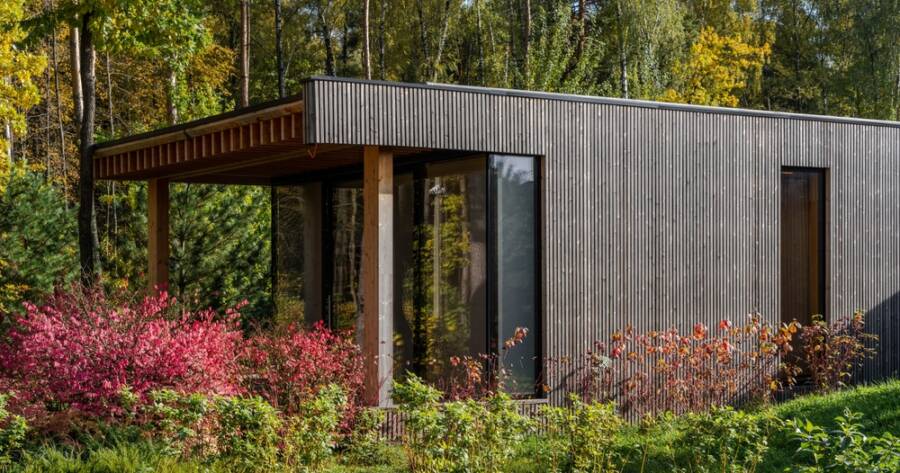Modular homes are redefining modern living with their affordability, efficiency, and customizability. Built off-site and assembled quickly, these prefabricated homes offer high quality at a fraction of the cost of traditional construction, making them a value-packed housing option.
What Are Modular Homes?
Modular homes are prefabricated houses built in sections, or modules, in a factory before being transported to the building site for assembly. Unlike traditional homes, which are constructed entirely on-site, modular homes are manufactured in a controlled environment, ensuring consistent quality and faster production times.
Once the modules are delivered to the chosen location, they are assembled on a permanent foundation, just like a traditionally built home. Modular homes are highly customizable, with a variety of floor plans and design options available to suit individual tastes and needs. They must meet the same local building codes and standards as site-built homes, ensuring they are safe and durable.
Additionally, the modular construction process reduces waste and lowers building costs, making this an attractive and efficient housing solution. Whether you’re looking for a smaller home or a multi-story property, modular homes offer flexibility and affordability without compromising on quality.
Benefits of Choosing a Modular Home
Modular homes offer numerous benefits, making them an increasingly popular housing choice for people in the United Kingdom. One of the primary advantages is affordability. Since modular homes are built in factories, they benefit from bulk purchasing of materials and a more streamlined construction process, leading to lower overall costs.
Additionally, they have shorter construction times, allowing homeowners to move in more quickly compared to traditional homes. Modular homes are also highly customizable, giving buyers the freedom to choose from various floor plans, layouts, and finishes that suit their preferences and lifestyle.
Another key benefit is energy efficiency—modular homes are often built with sustainable materials and come with modern insulation and energy-efficient windows, helping to reduce utility bills. Furthermore, the controlled factory environment ensures a high level of quality control, reducing the likelihood of errors during construction. These homes also generate less waste and have a smaller environmental impact, making them an eco-friendly choice.
What to Consider When Choosing a Modular Home
When selecting a modular home, it’s important to consider several factors to ensure it meets your specific needs. Start by determining the size and layout you require. Modular homes come in various sizes, from small cottages to large multi-story houses, so think about your family’s current and future needs.
Next, evaluate the available floor plans and customization options. Many manufacturers allow you to choose interior finishes, room configurations, and even exterior designs.
Budget is another critical factor; while modular homes are generally more affordable than traditional homes, the final cost can vary depending on the level of customization and additional features. Be sure to consider the land where your modular home will be placed, as you’ll need to ensure it’s suitable for installation and complies with local zoning laws. Finally, research different modular home manufacturers and read reviews to find a reputable company with a strong track record of quality and customer service.
Financing and Installation Considerations
Financing a modular home is similar to financing a traditional home, but there are a few key differences to keep in mind. Many banks and mortgage lenders offer loans specifically for modular homes, but it’s important to ensure the lender is familiar with the modular construction process.
You may need two types of loans—one for the construction phase and a standard mortgage once the home is assembled on the foundation. Installation is another important consideration, as the land must be properly prepared before the home is delivered. This includes ensuring the foundation is built, utilities are connected, and any necessary permits are obtained.
Modular homes typically arrive 80-90% complete, but final touches such as roofing and exterior finishes will need to be done on-site. By carefully planning your financing and installation, you can ensure a smooth process from start to finish, making your modular home a stress-free and cost-effective investment.
Learn More About Modular Homes
Modular homes offer a cost-effective, customizable, and environmentally friendly alternative to traditional housing. With their quick construction times, high-quality materials, and energy-efficient designs, they provide excellent value for those looking to build their dream home.
By understanding the benefits, considering factors like size and layout, and planning the financing and installation, you can make an informed decision that suits your needs and lifestyle. Learn more about modular homes to discover how this innovative approach to construction can help you achieve modern, affordable living without sacrificing comfort or style.
